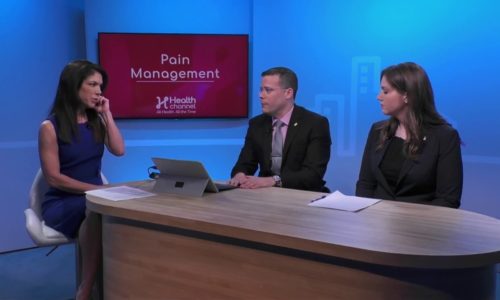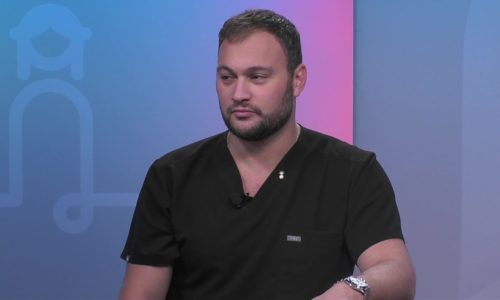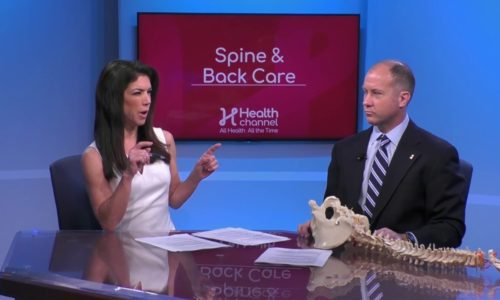Living with Back and Neck Pain: A Doctor’s Journey from Physician to Patient |

Back and neck pain—for those who suffer from it, the experience can be deeply debilitating, interfering with daily activities, sleep, and emotional well-being. For years, Dr. Georgiy Brusovanik, a Minimally Invasive Spine Surgeon at Miami Neck & Back Specialists, has helped thousands of patients manage these conditions. But it wasn’t until he became a patient himself that he truly understood the toll it takes. On a recent episode of Ask the Doc: No Appointments Needed, Dr. Brusovanik opened up about his own journey with back pain and offered expert insights for viewers navigating similar struggles.
From Doctor to Patient: Dr. Brusovanik’s Personal Battle
At age 45, Dr. Brusovanik began experiencing relentless nerve pain after years of managing back discomfort. He shared that his L5 nerve was compressed due to disc degeneration—a condition he had long treated in others. After five epidural injections, each one offering less relief and becoming more painful to administer, he made the decision to undergo a two-level disc replacement—a procedure he routinely performs himself.
“I woke up and the pain was gone immediately,” he shared. “Within three days, I was back in clinic. In a week, I was back in the operating room.” His story now helps him empathize even more deeply with patients, offering not just medical expertise, but lived experience.
The Role of Epidural Steroid Injections
Many patients, like Alex, a mid-80s viewer who asked about next steps after receiving an epidural, wonder why they should consider injections if they only offer temporary relief.
Dr. Brusovanik explained that epidurals are diagnostic tools as well as therapeutic. They act as a “periscope into the future,” pinpointing the exact source of pain. If the injection gives significant immediate relief, it confirms the pain’s origin and guides treatment decisions—helping avoid unnecessary or incorrect surgery.
Diagnosing the Root Cause
Jordan, a 21-year-old athlete, shared his struggle with severe back pain and a string of inconclusive diagnoses. Dr. Brusovanik emphasized the importance of diagnosis before jumping into treatment. Advanced imaging like MRIs and strategically placed injections help confirm which vertebra or disc is the true pain source.
“Don’t settle for vague answers,” he advised. “Keep looking until a doctor can give you a confident, clear explanation.”
To Cure or To Treat?
Sierra raised a philosophical question—can back pain ever truly be cured? Her doctor said he could only “treat” her pain, not cure it.
To that, Dr. Brusovanik responded, “Semantics shouldn’t stand in the way of your healing. Whether you call it a treatment or a cure, the goal is to live without back pain.” He encouraged Sierra to seek a second opinion, reminding viewers that finding the right physician is critical to both treatment success and emotional reassurance.
Preparing for Surgery
For those considering spine surgery, Susan asked how best to prepare. Dr. Brusovanik outlined these key steps:
- Try conservative care first – Epidurals may help you avoid surgery and confirm diagnosis.
- Choose the right surgeon – Someone accessible, honest, and committed.
- Complete a pre-operative medical clearance – Check your heart, lungs, and blood clotting.
- Quit smoking – Smoking inhibits healing and increases infection risk.
- Review your medications – Especially anticoagulants or NSAIDs.
- Plan your recovery support – Arrange for help with daily tasks and pet care.
Non-Surgical Options: Managing Pain Conservatively
Shelly, who suffered back pain after a car accident, expressed fear of surgery. Dr. Brusovanik stressed that a properly targeted epidural steroid injection can significantly reduce pain and, in many cases, eliminate the need for surgery.
Neck Pain and its Surprising Symptoms
Joseph brought up neck pain, which sometimes prevented him from turning his head. Dr. Brusovanik explained that stiff muscles are often a protective response to disc issues in the cervical spine. Symptoms may include headaches, jaw pain, shoulder discomfort, or tingling in the arms.
Proper diagnosis is again essential—starting with a physical exam and MRI, followed by potential targeted injections.
Stress and Spine Health: A Real Connection?
Maria asked whether her stress could be causing flare-ups in back and neck pain. While stress can amplify perception of pain, Dr. Brusovanik encourages patients to seek an organic explanation first, such as a herniated disc or degenerative changes. “Don’t assume your pain is psychological until all physical avenues are explored.”
Sports, Aging, and Misconceptions
Roman, in his 20s, wondered if his high school baseball days were to blame for his back problems. While sports are often blamed, Dr. Brusovanik clarified that there’s no strong evidence that athletic activity accelerates disc degeneration. Like with all cases, imaging and expert evaluation remain the key to determining the source of pain.
Whether you’re in your 20s like Jordan or in your 80s like Alex, back and neck pain affects people of all ages. As Dr. Brusovanik’s journey proves, a solid diagnosis is the cornerstone of effective treatment. Be persistent, ask questions, and never hesitate to seek a second opinion.
Watch the full episode of Ask the Doc: No Appointments Needed here: https://youtu.be/K3XuN6hjdJQ








